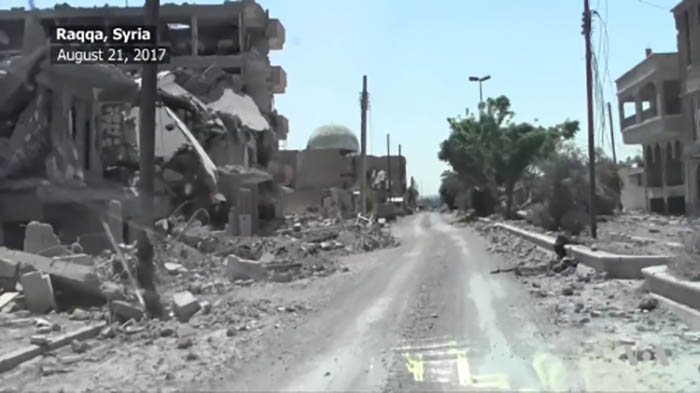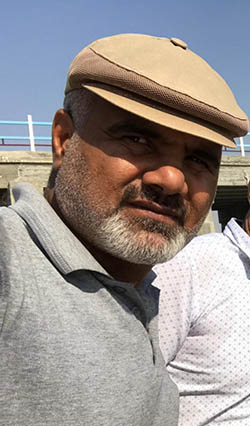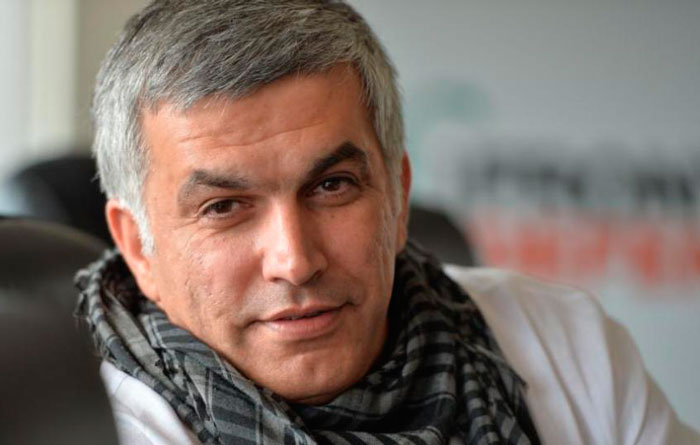Syrian photographer documents destruction by walking tightrope
[vc_row][vc_column][vc_column_text]
His absolute independence is what saved him in all the years that he stayed in Raqqa, the Syrian city where photographer Aboud Hamam was born and raised and that he refused to leave, even during the years that Isis was in charge. Under the current rule, he finally let go of his pseudonym for years, Nur Firat. “I miss Nur Firat sometimes,” Hamam said during a recent interview in Raqqa. “He achieved a lot.”
The interview takes place at the banks of the river Euphrates, which streams through the city. There is a tea garden, if you can call it that: five broken plastic chairs under the trees and around a small water basin, where fresh tea is served in small glasses. In one of the trees, a garden hose is wrapped around a branch. Tiny holes are punctured in it, causing a fine, lukewarm rain to drizzle down on the tea drinkers. Aboud Hamam comes here daily to escape the summer heat. The rest of the day, he walks through Raqqa, both his professional camera and his smartphone always ready to shoot. Hamam said: “Most of my colleagues are in Europe or the US now; most of them I don’t even know exactly where. I will never leave. I want to share the real picture of the city.”
In the early days of the Syrian uprising and the subsequent Syrian war, Hamam worked for Sana, the Syrian state news agency. He worked mostly in Damascus and earned a good income. It is in those days that he first started to use the pseudonym Nur Firat – the last name is Arabic for Euphrates. Hamam explained: “I used it for photos that could get me in trouble with certain groups in the conflict. Sometimes, mostly when there were jihadists on the pictures, I wouldn’t use a name at all.”

Aboud Hamam. Credit: Aboud Hamam
In 2013 Hamam decided to quit working for the regime’s news agency. He returned to Raqqa, where the Free Syrian Army was trying to take control, and started working for Reuters. During much of 2013, several groups, among them jihadists, tried to take the upper hand, until, in the early days of 2014, Isis won. Soon, the group declared Raqqa the “capital” of its so-called caliphate. It is in these times that Abood Hamam made a crucial choice, he explained: “Photographers who were in favour of the FSA, left the city when Isis was getting stronger. Those who returned later were therefore suspected by Isis of FSA sympathies. I hadn’t left, so this suspicion didn’t apply to me. This is why Isis didn’t bother me.”
He continued photographing. “Isis allowed photographers to take photos of things they wanted the world to know,” Hamam said, “but I secretly took other pictures too, for example of their tortures and crimes. Those I shared under my pseudonym.”
He smiled when he added: “Sometimes I used the name Abu Nur Libiye, because I had made some foreign fighters believe that I was from Libya.”
He left Raqqa for five months to visit his family, which had taken refuge in Saudi Arabia. When he came back, permission to take pictures had ended because too many images came out that Isis didn’t approve of. “I confined to taking pictures of trees by the river,” Hamam remembered. “There were eyes on me all the time, at every checkpoint they would check the photos on my phone.”
Didn’t Isis try to coerce him to work for them? Hamam: “They did, but I diplomatically refused. The Isis members were not all foreigners and I knew fellow Raqqans at the police, and they knew me from before the war. They would tell their superiors that I was against the regime in Damascus and convinced them to leave me alone.”
Meanwhile, Isis was weakening in both Iraq and Syria. They started losing territory in Syria at the hands of the Syrian Democratic Forces, a Kurdish-Arab alliance supported with airstrikes by the international coalition. When the final battle over Raqqa was about to commence in 2017, Aboud Hamam escaped to Idlib – still in opposition hands and currently under heavy Russian bombardment – because the battle would be fierce and civilians were supposed to leave the city. There, he could do his work again, although he had to use his synonym because of the opaque power balances in and around the city. When Isis was defeated in Raqqa, he immediately got ready to return. Two weeks after the SDF’s victory, he did.
“I saw our city, our memories, our childhoods, everything destroyed,” he recalled. “The first day I was in shock, the second day I cried.” Then he set up two Facebook pages, Abood without barriers and Raqqa pictures. “There, I share nice photos. I try to make even the destruction look nice, for example with a picture of a bridal shop next to a destroyed building or a meal with olives eaten in a dusty street. Daily life. It is good for my psychology because I am damaged. And good for the city. I know for some people my pictures were the tipping point in their decision to return to Raqqa.”
Soon after he returned, the SDF security forces detained Hamam. They didn’t know who he was and just saw a man wandering the streets with a camera and living in a half-destroyed house with satellite internet. “When they asked me who I was, I told them I knew the city better than they did. They held me for ten days. Then they concluded I was okay and let me go. They haven’t bothered me since. I can work freely.”
So he wanders the streets again.“I feel like the guardian of the city sometimes. I know every street, I notice every building being renovated or pulled down, I detect every citizen returning,” he says. And Raqqans know him. During lunch in a perfectly renovated restaurant with two destroyed floors on top of it, a group of men and women recognise him and request a selfie, which he agrees to.
He didn’t immediately let go of his pseudonym after the new rulers had come to the city. Nur Firat had become dear to him. But there is something else: “I believe that if you want to tell the real story as a journalist, you have to forget about personal fame. Do you know what’s important to me? That Raqqans trust me. They know I am independent. Some time ago, a sound bomb went off in the city. The SDF said it didn’t mean much. People can be suspicious about that, but if I don’t give it attention on Facebook, people know that it’s nothing to worry about. It makes them feel safer. Journalism doesn’t mean you have to share everything, it means you have to show the reality. Leaving unimportant things out can be part of that.”
Reuters, you could say, is Abood Hamam’s day job, while his heart is in his Facebook pages and with his fellow Raqqans. He smiled and said: “I do miss Nur Firat. He succeeded, he showed a lot. He may have been more successful than I will ever be.”[/vc_column_text][/vc_column][/vc_row][vc_row][vc_column][vc_basic_grid post_type=”post” max_items=”2″ element_width=”6″ grid_id=”vc_gid:1566207560032-07963279-6fe2-8″ taxonomies=”213″][/vc_column][/vc_row]

